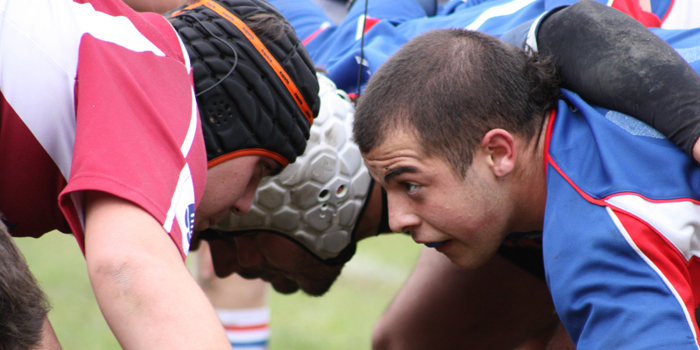
I originally wrote this article some fifteen years ago, at least as a collection of random thoughts and ideas, so I thought it was high time that I updated it somewhat, although most, if not all, of it, still holds very true.
I have been a trainer of some sort or another since 1979; for the last 30 years, I have been involved in the physical preparation of professional athletes, I am just learning to ask the correct questions, and I am far from finding the answers, but a few concepts I have come to believe are 100% truth.
As Robbie Deans, my former head coach at both the Crusaders and Wallabies, is often to be heard saying, "Start with the end in mind." This applies to so many aspects of training and performance. We work back from the start date of our competitions, planning each phase and looking at "phase-specific loading" for all weight room movements as well as our running metrics.
Lead From The Front
Coaching is an extension of teaching, so get out of your office and teach, especially in the gym. You are constantly correcting wee aspects of a lift. Our aim is the perfection of technique, so if you are not lifting yourself, start, it makes a lot of difference for your athletes and you. Whatever you walk past, you accept, so if you see something that does not look right, say and, more importantly, do something. Everyday Better is my motto in this respect.
Whenever you lift, you are on show, so be a technician and lift well. You do not have to be the strongest, but you should try at all costs to have the best technique. Whether you like it or not, you are a role model, so what behaviors do you want your athletes to follow?
With position comes responsibility, and I would hope that with any level of responsibility comes accountability, authenticity, humility, and empathy.
If you do not know, then ask someone; I hate that phrase "fake it till you make it." Just fess up and say so and then go and find an answer. If you say you are going to do something, do it promptly; this is INTEGRITY. Of course, there will always be someone more intelligent than you or I who will be able to help. Maybe Mel Siff, Fergus Connolly, and Louie Simmons are the exceptions and the only genuine geniuses I have ever had the pleasure of meeting in our field of endeavor.
Soak Up Information and Knowledge Like a Sponge
Go to conferences. You will always pick up at least one helpful idea, and often you will have what you are currently doing reinforced by a few speakers. However, do not be surprised to find out that you learned more by sitting around between sessions with other people just chatting about what they are doing.
To quote my great colleague Peter Harding, "You are there to train, not entertain" and "complicate to profit." There are people out there that make a straightforward job extra complicated, cut away all the hype and all the commercial emphasis, and get your players fit, fast, and strong/powerful. All strength and conditioning coaches need to have an established training philosophy; what is your WHY? Some bounce from new ideas to fads and often 'throw the baby out with the bath water.' Remember, as someone once said, "If you do not stand for something, then you will fall for anything."
Be Willing to Change
One of my favorite all-time quotes from Louie is, "Everything works, but nothing works forever." There are so many different movements and methods at your disposal. Trial them on yourself first, then see if they are relevant to the group you are working with and rotate through them over time. This is also part of the teaching/learning process for both coach and player, see what works and be open to new ideas (growth mindset).
Don't judge how good a strength and conditioning coach/program is in rugby by the results of the team they coach. In my situation, when you have possibly the best numbers, ten and seven, playing together, you will win more games than you lose. They are the rock stars; people like me are the roadies. Great players and great team coaches make people in my position look good; people often ask why the Crusaders are so successful; they have a great culture, recruit people with great character, and work hard. So is the strength and conditioning program partly responsible? I hope it is, even if it is just keeping key players on the field.
And Then Change Some More
I no longer believe in periodization in a classic sense; I think, as Louie Simmons has often said, "Whatever you do not train, you lose." Therefore, I want to touch on every aspect of training each week but prioritize what needs to be done first as a tenet of my "needs-based" training philosophy.
Your state of readiness governs the ability to train and perform; recovery is king. I do not believe in over-training, but under-recovery will get you every time.
Rugby is a collision sport. Sometimes the rules go out the window, did the gladiators of Rome ensure that the pelvis was in the correct position before they engaged in a life-and-death struggle? Players often take upwards of five days to recover from a match, and I have players who have done no conventional leg work for an entire season and still deliver every week of the season. Conversely, I have had players who work hard every week in the power rack, and these also provide week in and week out; there is no one generic program, and individualization within the confines of a team sport is the Holy Grail of strength and conditioning.
My basic philosophy is to get players strong and powerful, metabolically capable, and as quick as they can be, and then give them to the head coach to show them what he wants them to do. Does anything that I do transfer to the field? To tell you the truth, I do not know. But confidence transfers, as Joe Kenn often says. I believe physical and mental toughness transfers, so hopefully, a part of what I do helps a player to give his best on the field of battle.
Do I make a difference? I hope so, but I do not know; it is all about relationships, building them, developing them, and the player knows that you genuinely care about their well-being as people first and athletes second. I trained as a PE teacher initially since there was no other course around for old guys like me. Still, teaching taught me two invaluable traits in my current role, communication skills, first and foremost, and organizational skills. I may have been chasing my tail ever since on the science but knowing your players has always been number one in my book.
If I Could Go Back in Time...
I would change just one thing. I would do a pure science degree first to get a complete grounding in a scientific discipline, whether it was math or physics, my favorites. Then, I would do a master's or doctorate in biomechanics and a diploma in teaching along the way.
For those entering the profession, thank you for carrying the torch; it is a wonderful, rewarding career, and for those of you who have been in it for a while, keep doing what you do best, and to you all, keep it simple, never lose your sense of humor and always have fun.
As Confucius is reported to have said, "Find a job you enjoy, and you will never work a day in your life."
So, enjoy.
Image credit: jcbm39©123rf.com

Ashley Jones has worked in three professional sports across 30 years and four continents. He was awarded the NSCA's Professional Coach of the Year in 2016. Ashley holds his CSCS (Certified Strength and Conditioning Specialist) since 1988 and is an honorary lecturer in the School of Therapeutic Sciences, University of Witwatersrand, Johannesburg, SA.










always appreciate you passing on your knowledge.
Thank you.
Martin.
Some real insightful gems.
There is no substitute for years of hard work and dedication in a field or pursuit.
thanks for the amazing content as always!
Your work inspired me to get into studying more WSBB stuff and I could find alot of similarities.
One question though:
How would you program the running part for Rugby if some come off an injury or some time off? Haven't run in ages and former teammates invited me to old boys stuff.
Back in the day we would just run for like an hour in day 1 of the pre season, by the second week we were all dead but somehow coaches convinced us this is the way to accumulate aerobic capacity.
How would you approach this? Should one start with off feet conditioning before starting the running part?
Regards,
Mike